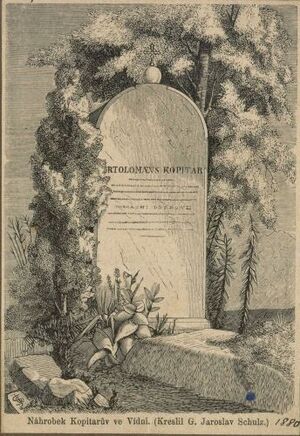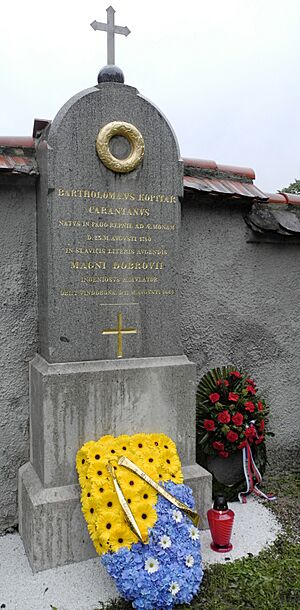Jernej Kopitar facts for kids
Jernej Kopitar, also known as Bartholomeus Kopitar (born August 21, 1780 – died August 11, 1844), was an important Slovene linguist and philologist. A linguist studies languages, and a philologist studies language in historical texts. Kopitar worked in Vienna, a major city in Austria. He was also an Imperial censor, meaning he reviewed books written in Slovene to decide if they could be published. He is famous for helping with the reform of the Serbian language, led by Vuk Stefanović Karadžić. Kopitar used his knowledge and influence to support this important language change.
Quick facts for kids
Jernej Kopitar
|
|
|---|---|
| Born | 21 August 1780 Repnje, Habsburg Monarchy
|
| Died | 11 August 1844 (aged 63) |
| Nationality | Slovene |
| Scientific career | |
| Fields | Linguistics Slavic studies |
Contents
Early life and education
Jernej Kopitar was born in a small village called Repnje. This village is near Vodice in what was then the Habsburg Monarchy. Today, this area is part of Slovenia.
After finishing school in Ljubljana, Kopitar became a private teacher. He worked for Baron Sigmund Zois, who was a famous businessman and supporter of the arts and sciences. Kopitar later became Zois's personal secretary and librarian. During this time, he met many smart people who were part of the Enlightenment movement. These included famous writers and thinkers like Anton Tomaž Linhart and Valentin Vodnik.
Career as a language expert
In 1808, Kopitar moved to Vienna to study law. However, he became very interested in comparing different Slavic languages. He spent the rest of his life studying them.
He started working at the Vienna Court Library as a librarian. Later, he became an administrator there. He also became the main censor for books written in Slavic languages and Modern Greek. This meant he had to approve these books before they could be published.
Kopitar was highly respected by other language experts in Europe. He often wrote letters to Josef Dobrovský, a Bohemian philologist who was like a mentor to him. He also corresponded with Vuk Karadžić, the Serbian philologist.
In 1808, Kopitar wrote and published the first scientific grammar of the Slovene language. It was called Grammatik der Slavischen Sprache in Krain, Kärnten und Steyermark. This book described the Slavic language spoken in different regions.
In another important work, Glagolita Clozianus (1836), he published a detailed version of the Freising Manuscripts. These manuscripts are the oldest known writings in Slovene. They are also the first known Slavic text written using the Latin alphabet. In this work, Kopitar also shared his "Pannonian Theory" about how Common Slavic developed. This theory is now becoming popular again among modern researchers.
Kopitar wanted to train new language experts. He hoped they would create new grammars and textbooks. He also wanted them to improve spelling and collect folk stories. Because of his efforts, a special position for Slovene language studies was created at the Ljubljana Lyceum in 1817.
Language reforms and debates
In the early 1830s, Kopitar became involved in the "Slovene Alphabet War." This was a big debate about how the Slovene alphabet should be changed. He supported big changes to the old Bohorič alphabet. These changes were first suggested by Peter Dajnko and then by Franc Serafin Metelko.
Kopitar's main opponent in this debate was Matija Čop, another philologist. Čop convinced a famous Czech scholar, František Čelakovský, to write a strong criticism of the proposed alphabet changes. This made Kopitar's ideas less popular. The debate ended with a compromise: the Gaj's Latin alphabet was adopted.
Kopitar and Čop also disagreed on whether Slovenes should develop their own unique culture. Kopitar thought that all South Slavic people should slowly develop a common literary language. He believed that Slovene dialects should remain the everyday language of farmers. On the other hand, Čop believed that Slovenes should create their own advanced culture in the Slovene language. He wanted it to follow modern literary trends. France Prešeren, a famous poet, strongly supported Čop's ideas and often argued with Kopitar.
Politically, Kopitar supported "Austroslavism." This idea aimed to unite Slavic people within the Austrian Empire. He was also a strong conservative. This meant he liked traditional ways and supported the government of Klemens Wenzel von Metternich. He had a somewhat protective view of peasant culture.
After the Alphabet War in the 1830s, Kopitar's influence in his home region of Slovenia decreased. However, he gained more influence among other South Slavic intellectuals, especially Serbs. He greatly influenced Vuk Stefanović Karadžić in creating a new standard for the Serbian literary language. This new standard was based on how people commonly spoke.
Death and legacy


Jernej Kopitar died in Vienna on August 11, 1844. It is said that Vuk Karadžić was with him when he passed away.
Kopitar's gravestone is now in the Navje Cemetery in Ljubljana. This cemetery is at the edge of what used to be the St. Christopher's Cemetery. A neighborhood in Belgrade, the capital of Serbia, is named after him. It is called Kopitareva Gradina.
Images for kids
-
Gravestone of Jernej Kopitar in Navje memorial park in Ljubljana.
See also
 In Spanish: Jernej Kopitar para niños
In Spanish: Jernej Kopitar para niños


